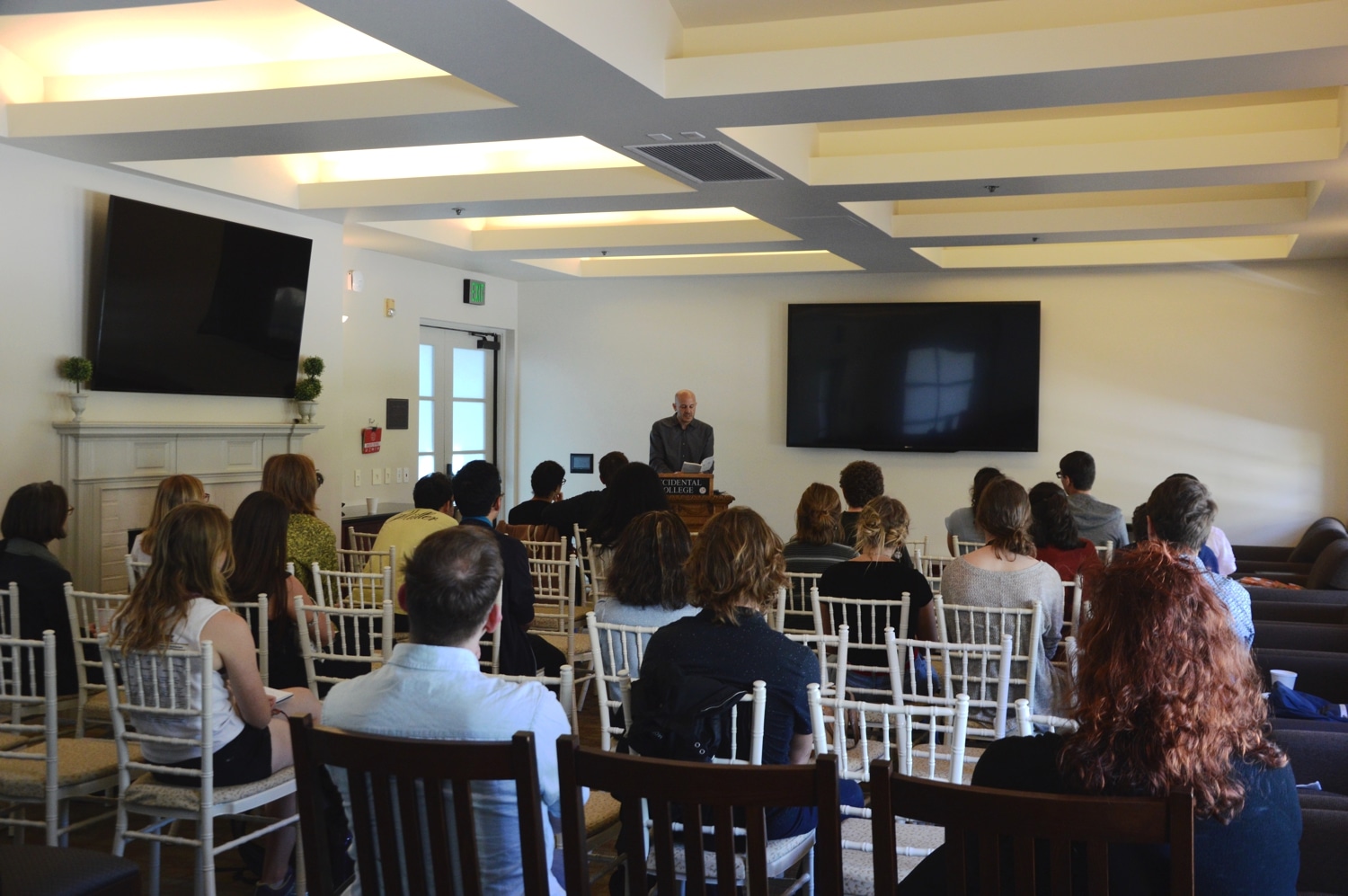
Palestinian-American physician, poet and translator, Fady Joudah, captivated faculty, students and community members April 12 in the JSC Morrison Lounge during a reading of his newest collection of poems. The poems were excerpts from Joudah’s new book, “Footnotes in the Order of Disappearance,” which was published last month. A discussion between the author and audience followed the reading.
Joudah is best known for his critically acclaimed debut novel, “The Earth in the Attic,” and his translation of Mahmoud Darwish’s “The Butterfly’s Burden.” The English Department, under the administration of creative writing professor Zinzi Clemmons, sponsored the event. Clemmons highlighted the importance of bringing Joudah to Occidental.
“Dr. Joudah wrote [an essay] about Islamophobia in literature, and I think that aside from being a brilliant poet, he is one of the most forceful voices out there who’s arguing for change in this area,” Clemmons said.
“Footnotes in the Order of Disappearance” is Joudah’s fourth collection of poetry, written mainly in prose. The readings ranged widely from themes of love and genitals to medical school and a refugee camp massacre.
Joudah explained that the collection focuses on loss and grief, and discussed how these themes are particularly relevant for him as a Palestinian American because he has personal experience with loss and disappearance. As a professional physician, Joudah said that he witnesses morbidity and mortality far too often. He spoke to the intersections of his seemingly distinct professions.

“They intersect through language, since medicine is sort of like its own new language with all of the Greek and Latin, being contemporized into modern usage and also associated with very specific knowledge, set of information,” Joudah said. “And so it becomes a way of speaking and thinking of the world differently, as I think that all literature aims at, and you know medicine has informed my poetry.”
Writing in both Arabic and English, Joudah discussed the concept of untranslatability — an idea in which he does not believe. He said that what individuals define as untranslatable is actually an issue of authorship and origin.
“As for the translation, I think it is also about the idea of or question of origin, culture, authenticity — so translation, sort of, is an interface of these questions, but I think it is actually a function of standing equal and fraternal with other literatures in the world,” Joudah said.
Joudah said he is interested in the idea of ownership. He questions the idea of solitary ownership in a section of his collection that includes a poetic dialogue between Joudah and exiled Syrian-Kurdish poet Golan Hajji. Furthering his focus on collaboration between writers, Joudah read a poem he wrote in response to a passage from Toni Morrison’s “Tar Baby.”
Joudah also commented on the complex feelings he has about writing in English, a language he associates with colonization.
“I think it is important to remember that colonialism doesn’t define the entirety of English, and English as a language of literature existed way before colonialism,” Joudah said. “I think that for some people it’s difficult to wake up in the morning and realize … you live in a language that actually kills your parents, for example, kills your own people.”
Clemmons said she appreciated Joudah’s thoughtful responses to student’s questions and his valuable insight, particularly regarding his writing process, which she described as illuminating to aspiring writers in the audience.
“To be a writer, you have to have some sort of internal, compelling force that doesn’t leave you, that constantly drags you into writing and wanting to say something through writing,” Joudah said. “And after that, it’s the curse of having to engage in a history of language, whatever the language is, because it’s really long. Inspiration often comes from moments of delusional narcissism I think.”
Layal Bata (first year) expressed her gratitude for Joudah’s wisdom and the event.
“As a Palestinian American, it’s really difficult to find spaces where my identity is represented,” Bata said. “That’s why it was so exciting to have the opportunity to have someone as important as Fady Joudah on campus.”
![]()






























